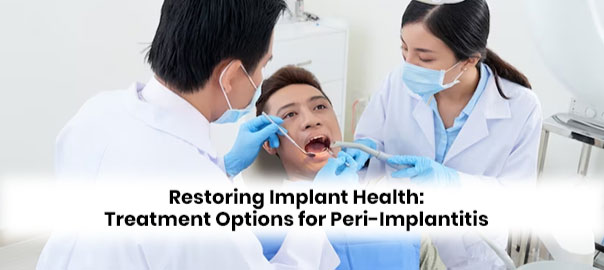
Restoring Implant Health: Treatment Options for Peri-Implantitis
This is an implant infection of the tooth: if left untreated, it may cause inflammation called peri implantitis, bone resorption, and failure of implant. However, there are some remarkable treatment options which can help manage or even improve the health of an implant. Let’s consider treatment options together:
Treatment
Non-Surgical Treatment
- Professional Cleaning: The surface of the implant is cleaned to remove plaque and calculus.
- Mechanical Debridement: Involvement of instruments that dislodge the bacteria and biofilm from the surface of the implant.
- Antiseptic Irrigation: An antimicrobial solution administered to the region that carries the implant for debridement purposes.
- Laser Treatment: Use lasers to remove infection and allow tissue to heal itself.
Surgical Treatment
- Flap Surgery: Elevation of a flap of gum and access to the implant bed for the removal of infected tissues and the re-establishment of the topography of the implant.
- Bone Grafting: For extensive defects of bone, a bone graft material is placed to augment the missing distal and proximal ends.
- Guided Tissue Regeneration: This is the installation of a barrier membrane, which enables the formation of new bone and excludes the growing of undesirable tissue.
- Soft Tissue Grafting: The installation of gum tissue to recession areas with the aim of improving esthetics and stabilizing the teeth.
Antibiotics
- Systemic Antibiotics: To be given in order to prevent infection and oedema. The antibiotic will depend on the virulence of the infection and the patient’s factors.
- Locally Applied Antibiotics: Using locally applied antibiotics in gelled or chip form on the site of the implant.
Maintenance and Prevention
- Oral Hygiene: Brushing, flossing, and interdental cleaning which is more plaque removal and prevention of infection.
- Professional Maintenance: Scheduling the patient to visit for periodically checking on the health of the implant during professional cleaning and to check on whether there is a need for more treatment.
- Smoking Abstinence: Promote smoking abstinence because this is one of the predisposing risk factors for the onset of peri-implantitis.
Factors for Effective Early Detection and Your Concern
Such a diagnosis at an early stage, combined with your desire to adopt maintenance plans, is going to benefit you immensely. If you feel that you are suffering from peri-implantitis, do not wait any longer to contact our competent dental professionals. We shall review your case and advise the most suitable treatment protocol for you.
So let’s give ourselves a chance, combined with your hard work and dedication, not to forget the support from our team of Dental Implantologists, we shall be able to regain your dental implants health, stride boldly out sporting that perfect smile for life. Contact us today and take that first step towards healthier happier implants.
Leave a Reply
Leave a Reply
Explore More Similar Posts
Explore More Blogs


Leave a Reply